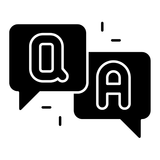FAQs about Blockchain

1. What is blockchain technology?
Blockchain is a decentralized, digital ledger that records transactions across multiple computers. It ensures transparency, security, and immutability of data without needing a central authority.
2. How does blockchain work?
Each transaction is recorded in a "block." These blocks are linked in chronological order, forming a "chain." Once added, data in a block cannot be altered without changing all subsequent blocks, making the system tamper-resistant.
3. What are the main benefits of blockchain?
- Transparency
- Security
- Decentralization
- Fast and cost-effective transactions
- Reduced fraud and errors
4. Is blockchain the same as Bitcoin?
No. Blockchain is the technology, while Bitcoin is a cryptocurrency built on blockchain. Many other applications beyond cryptocurrencies use blockchain too.
5. What are smart contracts?
Smart contracts are self-executing programs stored on a blockchain. They automatically enforce rules and agreements once predefined conditions are met, without human intervention.
6. Can blockchain be hacked?
While no system is 100% hack-proof, blockchain is extremely secure due to its decentralized and cryptographic structure. However, vulnerabilities may still exist in platforms built on top of blockchain.
7. What is a decentralized application (dApp)?
A dApp is an app that runs on a blockchain network instead of centralized servers. It offers increased transparency, user control, and resilience to censorship.
8. What industries use blockchain?
- Finance (cryptocurrencies, DeFi)
- Supply chain management
- Healthcare (secure medical records)
- Real estate
- Voting systems
- Entertainment (NFTs)
9. What is a private vs. public blockchain?
- Public blockchain: Open to anyone (e.g., Bitcoin, Ethereum).
- Private blockchain: Restricted access, used within organizations for internal use.
10. What is mining in blockchain?
Mining is the process of validating and adding new transactions to a blockchain (mostly in Proof-of-Work systems like Bitcoin), involving complex computations and energy consumption.
11. Are blockchain transactions anonymous?
They’re pseudonymous. While wallet addresses are visible, they don’t directly reveal personal identities—though transactions are publicly accessible.
12. What is proof of work vs. proof of stake?
- Proof of Work (PoW): Requires computational effort to validate transactions.
- Proof of Stake (PoS): Validators are chosen based on how many coins they "stake" or lock up.
13. How is blockchain different from a traditional database?
Traditional databases are centralized and modifiable. Blockchains are decentralized and immutable, with data structured as interconnected blocks.
14. What is a blockchain wallet?
It’s a digital tool that allows users to store, send, and receive cryptocurrencies and interact with blockchain applications.
15. Is blockchain legal?
Yes, in most countries. But its uses—especially involving cryptocurrencies—may be regulated differently depending on national laws.




